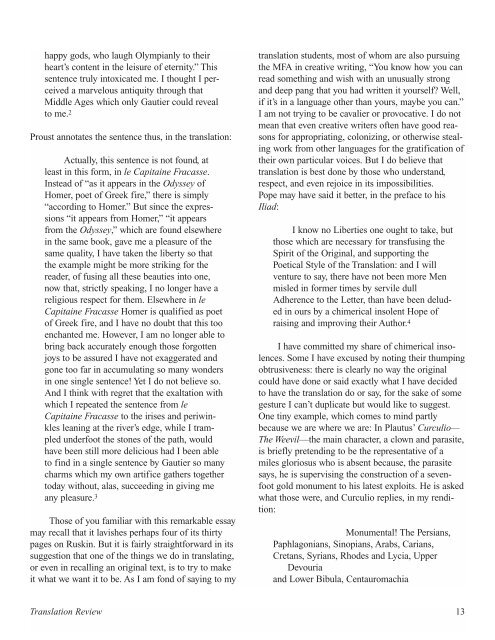Translation Review - The University of Texas at Dallas
Translation Review - The University of Texas at Dallas
Translation Review - The University of Texas at Dallas
You also want an ePaper? Increase the reach of your titles
YUMPU automatically turns print PDFs into web optimized ePapers that Google loves.
happy gods, who laugh Olympianly to their<br />
heart’s content in the leisure <strong>of</strong> eternity.” This<br />
sentence truly intoxic<strong>at</strong>ed me. I thought I perceived<br />
a marvelous antiquity through th<strong>at</strong><br />
Middle Ages which only Gautier could reveal<br />
to me. 2<br />
Proust annot<strong>at</strong>es the sentence thus, in the transl<strong>at</strong>ion:<br />
Actually, this sentence is not found, <strong>at</strong><br />
least in this form, in le Capitaine Fracasse.<br />
Instead <strong>of</strong> “as it appears in the Odyssey <strong>of</strong><br />
Homer, poet <strong>of</strong> Greek fire,” there is simply<br />
“according to Homer.” But since the expressions<br />
“it appears from Homer,” “it appears<br />
from the Odyssey,” which are found elsewhere<br />
in the same book, gave me a pleasure <strong>of</strong> the<br />
same quality, I have taken the liberty so th<strong>at</strong><br />
the example might be more striking for the<br />
reader, <strong>of</strong> fusing all these beauties into one,<br />
now th<strong>at</strong>, strictly speaking, I no longer have a<br />
religious respect for them. Elsewhere in le<br />
Capitaine Fracasse Homer is qualified as poet<br />
<strong>of</strong> Greek fire, and I have no doubt th<strong>at</strong> this too<br />
enchanted me. However, I am no longer able to<br />
bring back accur<strong>at</strong>ely enough those forgotten<br />
joys to be assured I have not exagger<strong>at</strong>ed and<br />
gone too far in accumul<strong>at</strong>ing so many wonders<br />
in one single sentence! Yet I do not believe so.<br />
And I think with regret th<strong>at</strong> the exalt<strong>at</strong>ion with<br />
which I repe<strong>at</strong>ed the sentence from le<br />
Capitaine Fracasse to the irises and periwinkles<br />
leaning <strong>at</strong> the river’s edge, while I trampled<br />
underfoot the stones <strong>of</strong> the p<strong>at</strong>h, would<br />
have been still more delicious had I been able<br />
to find in a single sentence by Gautier so many<br />
charms which my own artifice g<strong>at</strong>hers together<br />
today without, alas, succeeding in giving me<br />
any pleasure. 3<br />
Those <strong>of</strong> you familiar with this remarkable essay<br />
may recall th<strong>at</strong> it lavishes perhaps four <strong>of</strong> its thirty<br />
pages on Ruskin. But it is fairly straightforward in its<br />
suggestion th<strong>at</strong> one <strong>of</strong> the things we do in transl<strong>at</strong>ing,<br />
or even in recalling an original text, is to try to make<br />
it wh<strong>at</strong> we want it to be. As I am fond <strong>of</strong> saying to my<br />
transl<strong>at</strong>ion students, most <strong>of</strong> whom are also pursuing<br />
the MFA in cre<strong>at</strong>ive writing, “You know how you can<br />
read something and wish with an unusually strong<br />
and deep pang th<strong>at</strong> you had written it yourself? Well,<br />
if it’s in a language other than yours, maybe you can.”<br />
I am not trying to be cavalier or provoc<strong>at</strong>ive. I do not<br />
mean th<strong>at</strong> even cre<strong>at</strong>ive writers <strong>of</strong>ten have good reasons<br />
for appropri<strong>at</strong>ing, colonizing, or otherwise stealing<br />
work from other languages for the gr<strong>at</strong>ific<strong>at</strong>ion <strong>of</strong><br />
their own particular voices. But I do believe th<strong>at</strong><br />
transl<strong>at</strong>ion is best done by those who understand,<br />
respect, and even rejoice in its impossibilities.<br />
Pope may have said it better, in the preface to his<br />
Iliad:<br />
I know no Liberties one ought to take, but<br />
those which are necessary for transfusing the<br />
Spirit <strong>of</strong> the Original, and supporting the<br />
Poetical Style <strong>of</strong> the <strong>Transl<strong>at</strong>ion</strong>: and I will<br />
venture to say, there have not been more Men<br />
misled in former times by servile dull<br />
Adherence to the Letter, than have been deluded<br />
in ours by a chimerical insolent Hope <strong>of</strong><br />
raising and improving their Author. 4<br />
I have committed my share <strong>of</strong> chimerical insolences.<br />
Some I have excused by noting their thumping<br />
obtrusiveness: there is clearly no way the original<br />
could have done or said exactly wh<strong>at</strong> I have decided<br />
to have the transl<strong>at</strong>ion do or say, for the sake <strong>of</strong> some<br />
gesture I can’t duplic<strong>at</strong>e but would like to suggest.<br />
One tiny example, which comes to mind partly<br />
because we are where we are: In Plautus’ Curculio—<br />
<strong>The</strong> Weevil—the main character, a clown and parasite,<br />
is briefly pretending to be the represent<strong>at</strong>ive <strong>of</strong> a<br />
miles gloriosus who is absent because, the parasite<br />
says, he is supervising the construction <strong>of</strong> a sevenfoot<br />
gold monument to his l<strong>at</strong>est exploits. He is asked<br />
wh<strong>at</strong> those were, and Curculio replies, in my rendition:<br />
Monumental! <strong>The</strong> Persians,<br />
Paphlagonians, Sinopians, Arabs, Carians,<br />
Cretans, Syrians, Rhodes and Lycia, Upper<br />
Devouria<br />
and Lower Bibula, Centauromachia<br />
<strong>Transl<strong>at</strong>ion</strong> <strong>Review</strong> 13

















